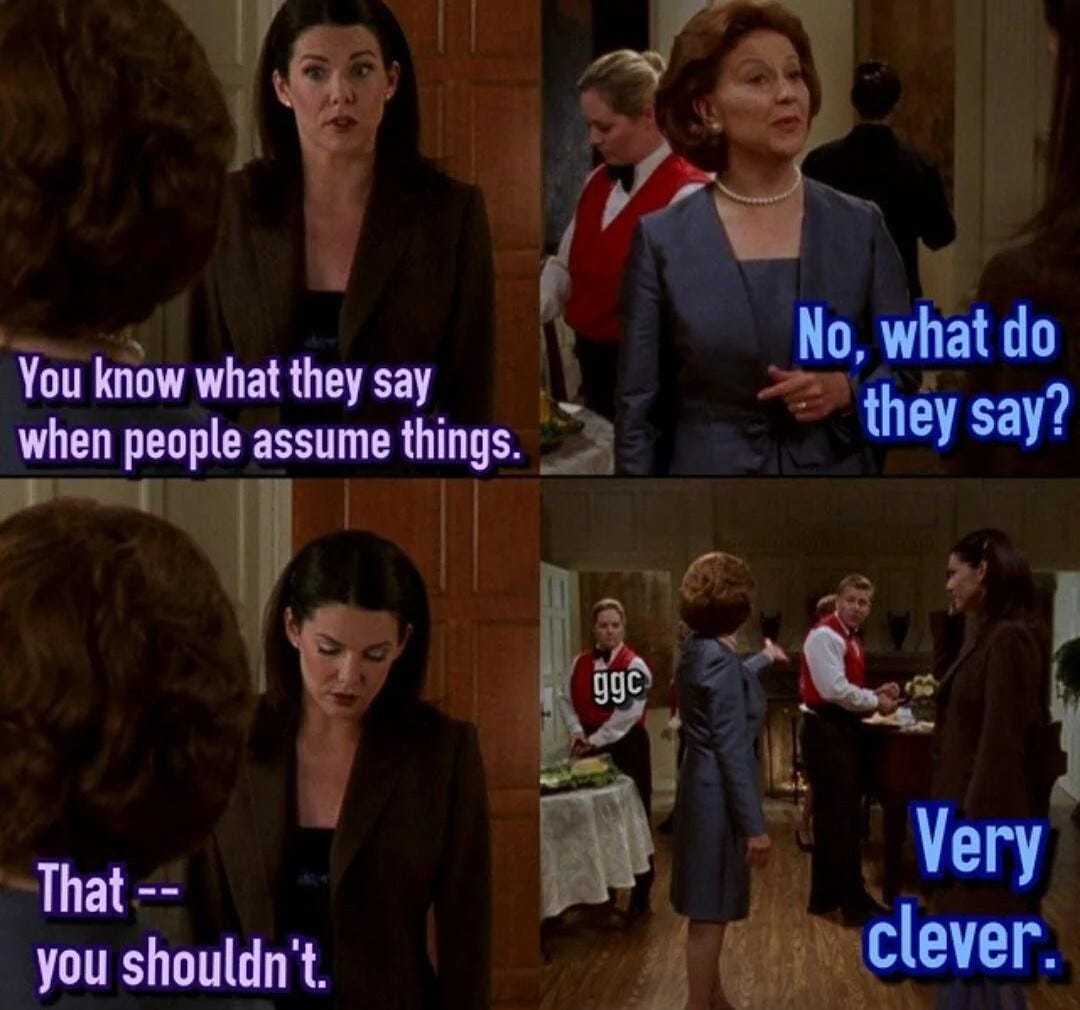I’ve attended a lot of grief support groups over the last (bloody hell) nine months.
One of their rules is that you’re not allowed to blab about what people say there to anyone else, let alone the entire internet.
But if I could share some of the details I’ve heard about how my fellow grievers have been treated by friends, family and acquaintances, trust me: they would leave you agog.
A.
GOG.
On a smaller scale, people have said and done several insensitive things since my mum died, and I’ve been as offended by their unoriginality as their audacity.
How can you not know what a cliché it is to spout “she wouldn’t want you to be sad”?
Imagine you’ve lost the person you’re closest to in the entire world. The one person who was always there for you.
Would you want someone to say, “Well, maybe you could see this as an opportunity”?
(I know the title of this post suggests helpful information and I promise we’ll get there but I need to rant a bit more first.)
While my mum was alive, one of her friends, who she’d known for many years, commented on her Facebook page all the time and leaned on her often for emotional support.
After mutual pals shared the sad news with her, I assumed she’d be in touch with a word of condolence, a card, or a text. I got nothing. Or as my mum liked to say, bupkis.
Another of her oldest friends, someone who frequently posted her long letters, sent me only a brief email in which she said she’d leave me alone to grieve. Just what everyone wants when life feels meaningless — non-stop misery without a shred of human contact!
A handful of condolers shared that they hoped I had people around me, a weird thing to say to an unmarried only child whose surviving parent lives six thousand miles away. It made me wonder if they thought I’d joined an improv troupe or had a passel of imaginary friends.
Sadly, until I develop a vivid fictional social life, the only person who’s around me most of the time is… me, and thanks to rampant over-exposure, I’m just not that into her.
I found it especially strange when the people who said-slash-did thoughtless things had survived significant losses themselves.
It didn’t make sense to me that anyone who’d been floored by the gut punch of sudden bereavement would suggest my mum is “out of her suffering now,” as if she hadn’t been plotting her future in bright purple pen the day before she died.
Perhaps most confusing are the people who announced, “I’m going to keep in touch all the time,” who I never heard from again.
Then there was the “I wish there was something I could do,” crowd, who I told, “There is — please keep in touch, it really helps” who I also never heard from again.
BUPKIS.
I know. Maybe their lives got busy, they suffer from social anxiety, or they don’t know what to say. Maybe they forgot. Maybe they never wanted to do anything to help in the first place.
It’s hard to gauge who genuinely cares and who’s saying what they think an occasion demands.
I’ve been useless in the face of other people’s grief myself — sending a card, some flowers if they were lucky, a few texts here and there, all of it tossed off, scattershot.
All of it with zero idea how much they were hurting, how much my support might have been welcomed (or could at least have been offered).
Now I know it’s desperate situation, an emergency, and that bringing up their loss could not possibly make them more upset.
I know it’s worth risking over-stepping, checking in more than you might otherwise, even if a griever isn’t your closest friend because it’s guaranteed that other people will be letting them down.
(I swear I’ll stop complaining any second now!)
I’m so grateful to be able to say that it hasn’t been all bad, that some people have stepped up for me, a handful in ways I never expected, that I’ll always be grateful for.
I have to caveat everything I’m about to say with the disclaimer that this is just my opinion, based on my experience, and your mileage may vary.
But what I’ve discovered grievers really, really want is… anything.
That’s the most important message I’d send to anyone dithering about how best to support someone amid the fresh hell of fresh grief: try anything. Anything you’re moved to do.
Send a card, text them, call and leave a message on their voicemail. Hire a singing telegram! OK, maybe don’t do that, you’re not Ross from Friends.
You might not be able to predict the exact right mode of communication for their current state but chances are, they’ll be grateful you tried.
You might not think you’re their best friend so why would they want to hear from you at such a sad time, but chances are, you can’t be too kind.
Imagine someone sobbing and shivering on their sofa as they have to call ten companies to tell them their loved one has died because the Tell Us Once service doesn’t work with an interim death certificate, even if the website says it will.
A kind word or thought from literally anyone (including a very nice woman from BT) could give them the strength to keep going for another hour or two.
The reason I often hear for people not making more of an effort is “I thought they’d have enough going on”. Unlikely! Grief days are looooooooooong.
Grievers will even melt if you send a card months later, enclosing a heartfelt condolence and a lovely memory of the person who died. We’re saps like that.
If you want to level up (and please do, especially if someone’s a close friend or relative, or anytime you have the capacity, because a lot of people won’t communicate how hopeless they feel), you could reach out for a conversation.
“Call me anytime!” sounds sweet and possibly sincere, but when you’re emotionally vulnerable, you’re too averse to rejection to contact anyone out of the blue. Better to say something like, “I’m free on Wednesday or Friday evening, would you like to chat on one of those days?”
Similarly, when it comes to tasks, chores and favours, “Let me know if there’s anything I can do,” sounds nice but puts a lot of responsibility on someone whose brain has just shut down.
It’s fair enough if you don’t know the exact right thing to do, the effort is what matters.
And while one-off acts are welcomed, consistency is even better. Can you call or call in once a week? Can you send a photo of your cat every other day (and if not, why not)? Can you cook for them once a month or send a card every year on their loved one’s birthday?
We’re not encouraged to go out of our way for people we love, especially if they’re not blood relations or romantic partners. But we can. It’s allowed. It’s appreciated.
And I sincerely think it’s the only way people survive life-shattering pain.
To be fair, some of that is advanced. You don’t have to take it all on, especially not all at once.
When you strip everything else away, what most touches my heart is to be asked questions.
Not weird ones, not intrusive ones, certainly not “Don’t you think she’d want you to be happy?” (Yeeees… and she’d also understand why I can’t be.)
What I most want is to be asked is something like, “How was today?” “How are you feeling this afternoon?” “What’s your grief been like this week?”
If things are bad (they are), I’m still not sorry you asked and I don’t need you to solve my situation (you can’t).
The only answer I ever need is some variation of “I’m so sorry/that sucks/I wish you weren’t going through this”.
I guess what it comes down to is that grievers want their grief to be allowed, to be acknowledged and to be respected. Not to be denied or overlooked or hushed up.
Maybe that’s why we often laugh in support meetings, why these are some of the best people I sort-of know: not being under pressure to pretend to be fine lets us be everything we are — bruised and battered, desperately sad but determined to connect.







Thank you Diane for calling out how lazy people are when their friends and relatives are grieving. I got more of a heartfelt when my cat died than when my mother was in the end stages of dementia.
My Dad died 9 months ago and I haven’t heard word one from any of my family or friends, and that includes my remaining sibling.
This will sound totally crazy but I tested out an AI therapist and they were much more effective than real live people.
What is going on in this world? I had a very small family which doesn’t help much, but there’s enough who could offer their support. Of course now I have to ask myself if I offered support when they were grieving and the answer is , not enough. Now I have the opportunity to examine my tactics, make some calls or write letters.
Moral of the story: it’s never too late ⏰
Thank you for reminding me that what I think is overstepping or unwelcome reminders is actually needed and appreciated. I do often think that people don't like me enough to want my messages.
Those who have grieved before and still don't support you are probably trying to push their own trauma far away, just like we're seeing with the pandemic. In a way, I get it, because that stuff is HARD, but it would go down a lot better if people at least had the insight and/or honesty to admit that they're doing it.